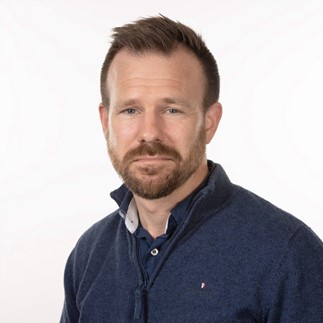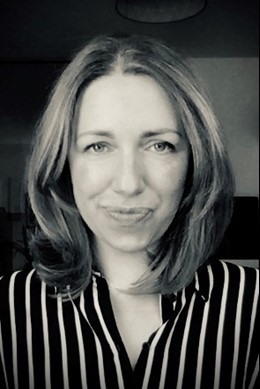Meet Special Advisor Eskil Grendahl Sivertsen from Norwegian Defence Research Establishment, BBC’s first Disinformation Editor Rebecca Skippage, Editor in Chief and CEO Kristoffer Egeberg of Faktisk.no and General Director Mari Velsand at The Norwegian Media Authority
– Fighting disinformation is one of the most critical missions of our time, said the Media Cluster’s CEO, Anne Jacobsen when she announced the conference earlier this year.
For the very first time, MCB Fact, a unique annual conference and meeting place dedicated to the work against disinformation is part of the Future Week festival.
One of the conference speakers, Eskil Grendahl Sivertsen, is one of Norway’s leading specialists on information warfare. We asked him what he believes are the main challenges when it comes to “fake news” in a war situation.

– If the information space is overwhelmed with vast amounts of disinformation, speculations and alternative theories, journalists and decision-makers have a harder time distilling what is factual and truthful. Plus, they can’t keep up with the tempo. We also risk that people resign and become indifferent, thinking that nothing can be trusted anyway, so why bother. In short, I would say fake news today is more about creating confusion, doubt, and indifference than trying to convince someone to believe in a lie. However, it’s important to appreciate the role fake news plays in promoting narratives or worldviews. This is very evident in wartime. Russia promotes several narratives to justify its illegal war - for example, that Ukraine is full of Nazis. Single examples of fake news about Ukrainian Nazis may be debunked, but a persistent and systematic flow of thousands of fake news stories may create an impression, conscious or subconscious, that Ukraine has a big Nazi problem, says Sivertsen.
– How is new technology changing the “communication war” and how do we combat that?
– Information warfare is not new, but the Internet, digitalized societies and social media have created endless opportunities for large gains with little risk. The major part of public debate happens on social media platforms, and is subjected to hidden algorithms that can be created, changed and manipulated without the public’s knowledge. The platforms are owned by a handful of tech companies and thus not under democratic control. This is highly problematic. I think we need to raise awareness and increase knowledge of the phenomena of information manipulation and work with the EU and others to regulate the tech giants. Last, but not least, we need to create systems and functions to create situational awareness in the information environment across sectors, identify our most critical vulnerabilities as a society and implement proactive strategies to limit the effects of malign influence and interference, says Sivertsen.
“The truth sandwich”
Sivertsen highlights “knowledge, skills and tools” as the most important for journalists to be able to fight disinformation.
– Knowledge about different actors’ ends, ways and means, and how algorithms work. Skills in open source intelligence (OSINT) and digital tools to conduct efficient research and mapping of the information environment. Journalists will be presented with dilemmas continuously. One is the risk of amplifying fake news by reporting on it. A good method to achieve editorial balance is “the truth sandwich”, for example, where you first describe what is true, then what the fake news says along with relevant context, then repeat what is true.
Trends: ‘Disinformation for hire’
Rebecca Skippage is BBC’s first Disinformation Editor. She leads teams based in the UK, Africa and India that observe, report and investigate disinformation trends, verify and debunk misinformation, and create digital material to help people recognize and avoid 'fake news'. She developed and led the BBC’s verification effort of fake and misleading images during the Ukraine crisis.

We asked her to describe the disinformation trends right now.
– Although most of the major platforms are making more effort to flag or demote disinformation, it is still a huge and growing problem, with bad actors evolving their techniques to stay ahead of the moderators. A key trend that is growing fast is what we’ve called ‘disinformation for hire’, which is – generally – state actors ‘subcontracting’ their misinformation to companies which use either computational propaganda or ‘astroturfing’ to spread their messages, manipulate voters or attempt to control the narrative. The other main issue for us in the BBC World Service continues to be the apparent lack of oversight of misinformation in non-English languages. It’s one of the reasons our teams work and report in the languages where the disinformation appears, says Skippage.
– What is the most important skill or tool people need to recognize ‘fake news’?
– In my opinion, media literacy is absolutely vital – and part of that is teaching critical thinking in schools. We are never going to be able to debunk every piece of misinformation; we need to equip people with the skills to spot the warning signs, and then know how to seek out good information from a trusted news or information source, says Skippage.
– What do you see as the biggest challenge when it comes to recognizing “fake news”?
– For everyone – and I include myself in this – it’s incredibly hard for our brains to deal with the amount of information that bombards us every day. It’s particularly difficult when it comes in the same personalized device that sits in our pocket and is in the same stream as cat memes and photos of our families. So without being suspicious of everything, we need to learn what the flags are to something that might not be right: does it make you feel overly emotional? What’s the source? Is it likely that that person or organization would have said that. And if in doubt – don’t share!
– What is your main motivation for working in this field?
– As a BBC journalist, getting accurate, impartial, timely, and accessible information to people is at the heart of what we do. When it became clear that there was a shift in the way people were receiving information; that much of what was online was wrong or manipulative, and that they weren’t necessarily prepared for that, I wanted to be at the forefront of combatting it. It’s a fascinating field: it evolves fast and needs an agile approach. I’m also incredibly lucky to work with a brilliant, global team of experts who are knowledgeable, tenacious and equally passionate about the fight against disinformation.
– Doing a tremendous job
The Norwegian Media Authority believes that independent editorial media and media literacy are the most important tools to combat disinformation.
– Norwegian news media are doing a tremendous job, and have really demonstrated their crucial role during both the pandemic and the last months during the war in Ukraine. I would like to highlight the collaboration between the media companies and the fact-checking service Faktisk.no, fact-checking material related to the war. This is an initiative of great importance, to stop disinformation from being spread, and also to keep up the trust of editorial media, says General Director Mari Velsand.
The Norwegian Media Authority (NMA) is working to help secure an open and informed public discourse.
– Combating disinformation and fake news is an important task for us. In our work, we underline the importance of facts and knowledge, and the NMA regularly conducts surveys on how disinformation is spread in Norway, and the public's ability to differentiate fake information from reliable content. We share insights to increase knowledge and to create engagement and debate about disinformation and fake news, says Velsand.
Combating disinformation by improving source criticism skills, is one of NMAs priorities.
– We develop teaching programmes related to media literacy, both targeting young people and seniors, that are two groups which we through our surveys know that are especially vulnerable. We also run information campaigns to increase the awareness of the risks of disinformation and give advice on how to detect disinformation and fake news. For example, we have recently run a campaign to strengthen resilience against disinformation related to the war in Ukraine, and another campaign to underline the crucial role of editor-controlled media in such situations, says Velsand.
The Norwegian Media Authority is also engaged in developing best practices against disinformation and introducing new regulations to combat illegal content at the European level in close collaboration with other media authorities and the Commission.
Platforms and policymakers
– What do you think will be the coming main challenges in this field?
– Reducing disinformation requires a joint effort from global platforms and policymakers. However, it is very important not to remove content that should not be taken down. It is of great importance to find the right balance between handling the risks of disinformation and securing freedom of speech. Digital exclusion is another area of concern. A precondition to be media literate, is having a basic understanding of the digital environment. We have to target different vulnerable groups, like seniors over 80, citizens outside of working life and first-generation immigrants from non-Western countries, to prevent digital exclusion, says Velsand.
– We see a great need for collaboration
Editor-in-Chief Kristoffer Egeberg has been the leader of Faktisk.no since its inception in 2017. The organization is the only one of its kind in Norway and is also part of the International Fact Check Network (IFCN).

– The MCB Fact Conference is an important initiative that we hope will intensify the work on this topic in the Media Cluster. Unfortunately, recent years have shown how vulnerable modern society is in the face of disinformation and fake news. We are concerned about the development and see a great need for collaboration. The Media Cluster is already an important meeting place for us, says Egeberg.
Reidun Kjelling Nybø, who is Secretary-General of the Norwegian Editors' Association, welcomes the new initiative.
– The increasing amount of misinformation and conspiracy theories is a development that concerns us. We are pleased that the work on fighting disinformation is strengthened in the Media Cluster. In Norway, we are fortunate that editorial media enjoy a high level of trust in the population compared to many other countries. Therefore, we have an opportunity to take the lead in this work, and together develop methods, competence, insight, and new tools that can contribute to ensuring an informed and enlightened population, also in the future, says Kjelling Nybø.
